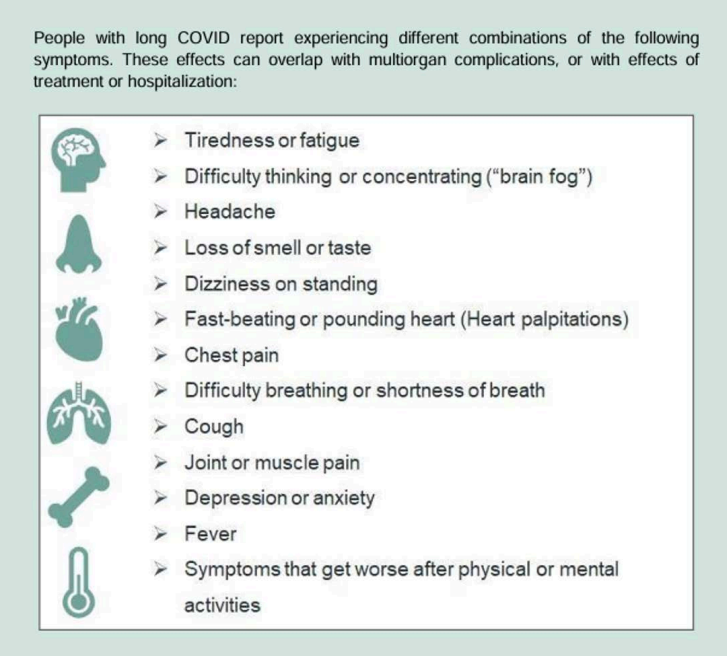Home » Long COVID: An overview of the condition and current recommendations on its management

Long COVID, post-COVID-19 syndrome, post-acute sequelae of SARS-CoV-2 infection (PASC), post-COVID syndrome or chronic COVID-19 are among some of the names used to describe the complex symptoms that patients experience following acute COVID-19 infection. The World Health Organisation defines Long COVID as “the continuation or development of new symptoms three months after the initial SARS-CoV-2 infection, with these symptoms lasting for at least two months with no other explanation”. The National Institute for Health and Care Excellence (NICE) defines this as post-COVID-19 syndrome, with the definition of Long COVID encompassing both ongoing symptomatic COVID-19 (four to 12 weeks after initial infection) and post-COVID-19 syndrome.
In Ireland, a person may be diagnosed with Long COVID if they experience symptoms that continue for at least three months after initial COVID-19 infection, with symptoms that last at least two months and are impacting on a person’s day-to-day life.
Estimates of those living with Long COVID vary widely, ranging from 1.8 per cent to 8.3 per cent in studies with a diagnosis of, or referral for Long COVID, and from 15 per cent to 53 per cent based on self-reported data. The results of the most recent study conducted in Ireland, the FADA study, which was based on self-reported symptoms, estimated that 16 per cent of the population sampled ever experienced symptoms of Long COVID. In the UK, it was estimated that 1.9 million people suffered from Long COVID in 2023, with 79 per cent reporting that it affected their day-to-day activities. It is estimated that worldwide, 65 million people fit the diagnostic criteria. Research into the underlying cause of Long COVID is ongoing.
A systematic review and meta-analysis of risk factors for Long COVID showed a number of epidemiological and clinical risk factors for development of Long COVID. Female gender, higher body mass index, smoking and older age were associated with an increased risk of persistent symptoms more than 12 weeks after acute COVID-19 infection. Hospitalisation or critical care admission were associated with a two-fold risk increase. Pre-existing conditions such as diabetes, asthma, COPD, anxiety, depression and immunosuppression were also associated with a higher risk. Conversely, two doses of COVID-19 vaccine have been shown to have a protective role in development of Long COVID symptoms.
The symptoms of Long COVID are many, with over 200 symptoms reported across ten organ systems. Patients may also have varying symptoms and varying degrees of severity of symptoms over time, which may last for months or years after COVID-19 infection. The symptoms can significantly impact a patient’s quality of life, where a person may not be able to continue with day to day activities or attend work or social events. This can contribute to symptoms of anxiety and depression, which may have preceded, or been as a result of, the physical manifestations.
Some of the most commonly reported symptoms of Long COVID include:
Multi-organ complications of COVID-19 infection and Long COVID include acute kidney injury, pancreatic injury or pancreatitis, liver injury or raised transaminases, myocardial inflammation and blood vessel coagulopathy. These effects may last for weeks, months or years after initial COVID-19 infection. Patients may therefore be more likely to develop new conditions or have worsening of existing conditions such as diabetes, blood clots or neurological conditions.
There can also be symptom overlap between Long COVID and suspected or known infection associated chronic syndromes, including the sequelae of Epstein-Barr virus, SARS-CoV, MERS-CoV and myalgic encephalomyelitis/chronic fatigue syndrome (ME/CFS).
Figure 1: Symptoms of Long COVID

Source: HSE Interim Long COVID Model of Care
There is no specific diagnostic text for Long COVID, and therefore exclusion of other causes is
necessary. For most patients, optimising quality of life through management of symptoms is the main goal of medical management. Focusing on the most bothersome symptoms, developing a rehabilitation plan, use of a diary to track symptoms and their severity, and optimising management of underlying conditions are all strategies employed.
The HSE ‘interim Long COVID Model of Care’ recommends a three-tiered approach to management of Long COVID.
These three tiers are:
Community pharmacists are a very accessible and well trusted resource and can play a very important role in the health and wellbeing of a patient suffering from symptoms of Long COVID. They can also play an important role in reducing the risk of a patient developing the condition, through promotion of infection prevention and control measures, and encouraging vaccination.
Community pharmacists can contribute to improved patient health and wellbeing in the following ways:
Although no medication is currently licensed for treatment of Long COVID, patients may be prescribed medication to manage symptoms, such as anti-inflammatory drugs or antidepressants. Pharmacists can counsel patients on the importance of taking medications correctly, as well as adhering to additional medical advice. They can also monitor for potential drug interactions, and ensure that any supplements that a patient is taking is appropriate.
Pharmacists can also support patients by optimising medicines use for other chronic health conditions, which can be exacerbated by Long COVID, and offering advice as appropriate. Encourage the person to complete a list of their medicines and supplements using the HSE ‘My Medicines List’, available at hse.ie/npqsd > Medication Safety Resources.
Self-management strategies are a key treatment for the management of Long COVID. These strategies focus on interventions to help with fatigue, autonomic dysfunction, and breathlessness among others. Encourage patients to complete a symptom diary, so they can track symptoms and their severity over time, as well as potential triggers that may worsen their symptoms. Self-tracking of Heart rate or Blood pressure may be advised by their GP, and patients should be well informed as to when to seek advice based on the measurements. Any recommendations around exercise should be tailored to the patient through their multidisciplinary team, due to the risk of post-exertional malaise. General advice around adequate nutrition will support their overall wellbeing.
If the patient needs further support and care, pharmacists should signpost to the appropriate healthcare provider, and direct to online resources that are available, such as the HSE website ‘Living with Long COVID’, available at hse.ie > Health A-Z > COVID-19 > Long COVID > Living with Long COVID. A multidisciplinary team is essential for the management of Long COVID, and management should be tailored to the person’s symptoms and quality of life. Patients may need further care team or specialist input depending on their most troublesome symptoms and their severity.
As COVID-19 is a new infection and therefore Long COVID a new condition, evidence is still emerging on best management, and the long-term effects are unknown. Research is ongoing into the underlying cause and potential treatment options. Pharmacists need to be aware of the signs and symptoms of the condition, to identify potential sufferers and direct them to appropriate resources available to them. The complexity and fluctuation in symptoms can make management difficult, which can have a significant emotional toll on a patient. Pharmacists need to be empathetic to this, and support patients as best they can to improve their health and wellbeing. Patients need to feel heard, supported, and know where to seek help as they need it. Finally, it is important that pharmacists keep up to date with new evidence as it emerges, to ensure that the advice and support that they are providing to patients is appropriate.
References available on request.
Lorna Quigley MPSI

MPharm PGDip, Programme Manager, National Clinical Programme for Infectious Diseases, Office of the Chief Clinical Officer, HSE
Highlighted Articles